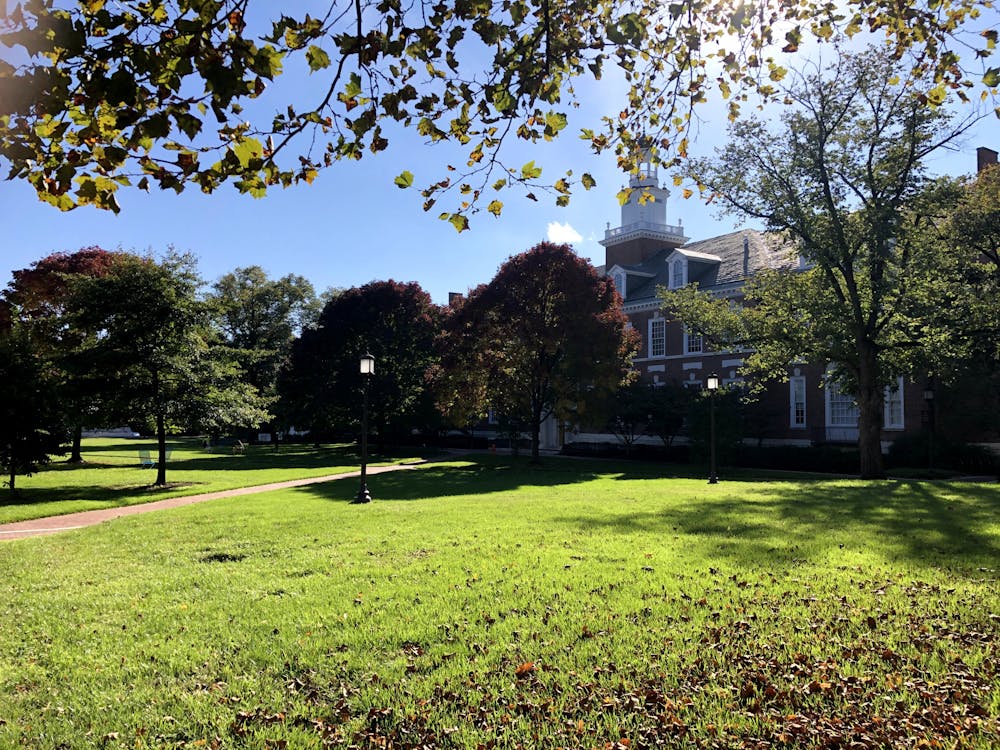“I didn’t choose to go vote at home in Pennsylvania. I requested my absentee ballot in August and wanted to vote early and get it out of the way without having to go home... About two weeks ago, though, I got an email that said my ballot was considered undeliverable by the USPS.”
These are the words of sophomore Laís Santoro, who, despite taking proactive measures to secure a mail-in ballot, did not receive one before Nov. 3. In an email to The News-Letter, Santoro described the process which forced her to drive home to Pennsylvania to cast her vote in-person.
While this was not the turn of events she hoped for, Santoro noted that she is privileged to be able to cast her vote at all, given the circumstances.
“I have the privilege of having transportation home. I have wifi and a car,” she wrote. “I can’t imagine how this voting system impacts communities predominantly of color, lower-income areas, people who can’t coordinate a time within the work day to go vote or find time at all given the long lines we’ve been seeing.”
Because of the COVID-19 pandemic, many voters found themselves requesting absentee ballots just as Santoro did. Mail-in and early voting is at an all-time high during the 2020 elections. However, this means that a decisive count was not reached on the night of Nov. 3.
U.S. President Donald Trump announced his own victory early this morning. However, many crucial swing states are not finished counting their ballots, meaning that he has not won.
States such as Pennsylvania, Wisconsin and Michigan did not begin counting their mail-in ballots until election night itself. It could take days for the result of the election to be called.
In an email to The News-Letter, junior Karnika Mehrotra explained her stress in waiting for the results.
“I can still remember 2016 — falling asleep while watching the results and waking up in tears to Trump’s election,” she wrote. “The fact that I was able to vote and had some level of agency in this election is heartening, but on the morning of Election Day, it does feel like a waiting game.”
Senior Dave Taylor worries that the results from certain states will be unclear, a repeat of Florida in the Bush v. Gore race of 2000.
“I am extremely anxious at the prospect of President Trump being elected in any scenario, but especially in a situation that is similar to the 2000 election, where we have an extended process during which ballots are being contested — or a tipping-point state like Pennsylvania is subject to intense litigation in a court battle,” he said.
Mehrotra highlighted that bigotry and discrimination are on the ballot.
“As a minority LGBT-woman, the results of this election will impact how the country’s leadership views people like me,” she wrote. “I fear for the safety of minorities who... fac[ed] voter intimidation and voter suppression at the polls.”
In an email to The News-Letter, junior Jevon Campbell noted that the breakdown of votes across the country will expose racism in its citizens regardless of the election’s outcome.
“It feels like my livelihood is at stake because depending on how the country votes, it will show how little this country cares about people like me,” he wrote.
Feeling that much is on the line, young voters across the country went to the polls in record numbers compared to previous elections.
The handling of the COVID-19 crisis was an important factor for many voters. According to Taylor, the nation’s public health depends on a Biden-Harris victory.
“The current administration has set a terrible example: not getting testing under control, not having a mask mandate, belittling the importance of masks,” he said. “I’m very confident that Joe Biden and Kamala Harris, if elected, will be able to get that problem under control.”
Trump has openly denounced the credibility of mail-in voting over the course of his campaign on the basis that it leads to voter fraud, a claim which has been disproven.
Given the president’s claims, Mehrotra is concerned that if a Biden-Harris win is announced, Trump will not concede the election, and the results will be up to the Supreme Court, where there is a 6-3 conservative majority. Three of the justices worked on the legal team that helped George W. Bush claim victory in 2000.
“In the case of Trump losing and refusing to engage in a peaceful transfer of power, I fear that the Supreme Court may sway in his favor,” Mehrotra wrote.
Taylor is anticipating protests, regardless of the result. However, he also acknowledged the need for people to come together once the election is decided.
“I hope we don’t have a lot of civil unrest and that there is a peaceful transition of power, if we’re lucky enough to have a transition of power,” he said. “In the event that Trump wins, I hope we are able to come together as a country and find ways of coping with that horrible outcome.”
Chris H. Park, the vice president of College Democrats at Hopkins, is a News & Features Editor for The News-Letter. He did not contribute reporting, writing or editing to this article.





